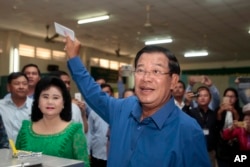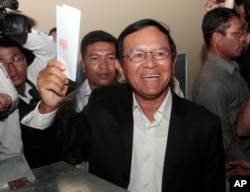Although the official results will not be released until June 25, the closely watched vote for Cambodia's commune council elections showed the opposition's growing strength and suggest that the national elections in 2018 will be a race between two parties.
Political analyst Ou Virak, president of the Future Forum, a think tank in Phnom Penh, on Monday told Hello VOA, a radio call-in show, that the 2018 general election will be highly competitive. He anticipates a two-party contest.
“In 2018 election, the smaller parties will have no chance,” he said. “This is because the competition between the two main parties is running so close. Therefore, voters will see the third party is merely a spoiler. They won't vote for the third party to spoil their ballots.”
Unofficial results posted late Sunday by Fresh News, a pro-government website, reported the ruling CPP had won 1,163 commune chief seats compared to 482 for the opposition CNRP. The Khmer National Unity Party, one of the 10 smaller parties that participated in Sunday's vote, won one seat.
If the tally is verified, it signifies large gains for the opposition, which won only 40 seats in the 2012 commune elections.
60 complaints of irregularities
On Monday, the ruling Cambodian People's Party (CPP) acknowledged the opposition's strong showing the day before but remained unfazed.
“We consider support going up and down in each place is simply a loss in a few battlefields, not the whole war,” Sok Isan told VOA Khmer. “Overall, we've won the whole war.”
Kem Sokha, president of the opposition Cambodia National Rescue Party (CNRP), said he hoped the local election results were an indication of support going into the general election scheduled for next year.
The National Election Commission received more than 60 complaints of irregularities during the campaign and voting. Despite political intimidation and harassment, the CNRP leadership said the party made a strong showing.
Before the vote, Prime Minister Hun Sen warned Cambodia could return to war if the CPP were to lose. During the months before the elections, opposition parliamentarians were beaten, defamation laws were criminalized, and the government banned anyone with a criminal conviction from elections. Hun Sen has also curtailed political street rallies.
“The CNRP was successful and took a big stride in the commune elections,” he said in a statement. “The result will be the foundation that we build on to win in 2018.”
As expected, most of those gains came in Cambodia's three largest cities — Phnom Penh, Battambang and Siem Reap. An estimated 89.52 percent of eligible voters participated in the current commune contest. A commune is a group of villages, which form a political entity akin to a ward in U.S. cities.
US embassy: 'An important milestone'
The U.S. embassy in Phnom Penh issued a statement on its Facebook page calling Sunday's election as “an important milestone in Cambodia's continued democratic development.”
On Sunday, Chan Samnang, a female opposition candidate standing in Russey Keo commune in the capital, told VOA she had won by some 3,400 votes over her CPP rival.
Samnang held the commune from 2007 to 2012 when she lost the seat amid claims of election fraud.
“The current voting system is not 100 percent good, but it is better than last time,” she said.
She claimed that she won this time around because locals recognized the work she had done for them in the past.
Wanted change
Peung Chansreyroth, 34, said she voted for the CNRP because she wanted change.
“I voted for the CNRP because I wanted a fair commune chief,” she said.
Oeun Kimheng, 21, a university student, claimed the previous commune chief was inefficient.
“Services for providing documents were always late,” she said. “Any party is fine with me, but my decision to vote depends on my confidence and belief in a party that is capable of performing its duties.”
The former commune chief, Moul Virak, declined to comment.
This report originated on VOA Khmer. Sun Narin contributed from Phnom Penh, Cambodia.






